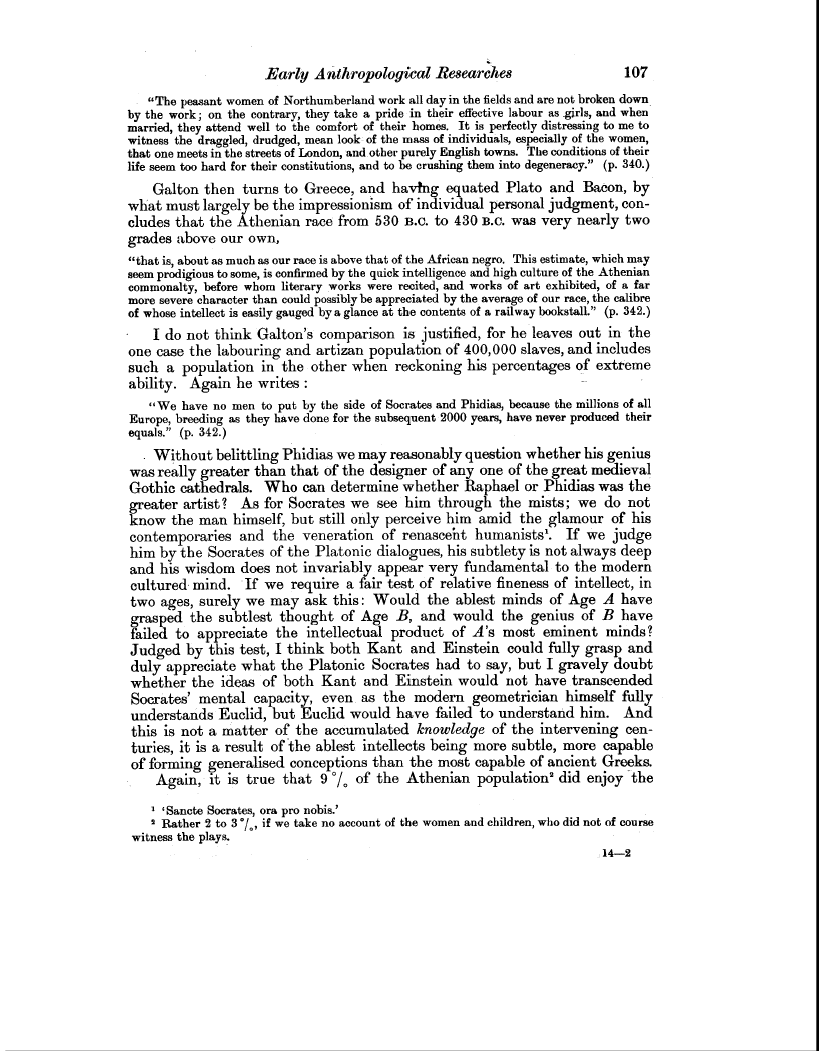Early Anthropological Researches 107
"The peasant women of Northumberland work all day in the fields and are not broken down by the work; on the contrary, they take a pride in their effective labour as girls, and when married, they attend well to the comfort of their homes. It is perfectly distressing to me to witness the draggled, drudged, mean look- of the mass of individuals, especially of the women, that one meets in the streets of London, and other purely English towns. The conditions of their
life seem too hard for their constitutions, and to be crushing them into degeneracy." (p. 340.)
Galton then turns to Greece, and having equated Plato and Bacon, by what must largely be the impressionism of individual personal judgment, concludes that the Athenian race from 530 B.C. to 430 B.C. was very nearly two grades above our own,
"that is, about as much as our race is above that of the African negro. This estimate, which may seem prodigious to some, is confirmed by the quick intelligence and high culture of the Athenian commonalty, before whom literary works were recited, and works of art exhibited, of a far
more severe character than could possibly be appreciated by the average of our race, the calibre of whose intellect is easily gauged by a glance at the contents of a railway bookstall." (p. 342.)
I do not think Galton's comparison is justified, for he leaves out in the one case the labouring and artizan population of 400,000 slaves, and includes such a population in the other when reckoning his percentages of extreme ability. Again he writes
"We have no men to put by the side of Socrates and Phidias, because the millions of all Europe, breeding as they have done for the subsequent 2000 years, have never produced their equals." (p. 342.)
. Without belittling Phidias we may reasonably question whether his genius was really greater than that of the designer of any one of the great medieval Gothic cathedrals. Who can determine whether Raphael or Phidias was the greater artist? As for Socrates we see him through the mists; we do not know the man himself, but still only perceive him amid the glamour of his contemporaries and the veneration of renascent humanists'. If we judge him by the Socrates of the Platonic dialogues, his subtlety is not always deep and his wisdom does not invariably appear very fundamental to the modern cultured mind. If we require a fair test of relative fineness of intellect, in two ages, surely we may ask this : Would the ablest minds of Age A have grasped the subtlest thought of Age B, and would the genius of B have failed to appreciate the intellectual product of A's most eminent minds? Judged by this test, I think both Kant and Einstein could fully grasp and duly appreciate what the Platonic Socrates had to say, but I gravely doubt whether the ideas of both Kant and Einstein would not have transcended Socrates' mental capacity, even as the modern geometrician himself fully understands Euclid, but Euclid would have failed to understand him. And this is not a matter of the accumulated knowledge of the intervening centuries, it is a result of the ablest intellects being more subtle, more capable of forming generalised conceptions than the most capable of ancient Greeks.
Again, it is true that 9'/. of the Athenian populations did enjoy the
' ' Sancte Socrates, ora pro nobis.'
2 Rather 2 to 3 °/o, if we take no account of the women and children, who did not of course witness the plays.
14-2

